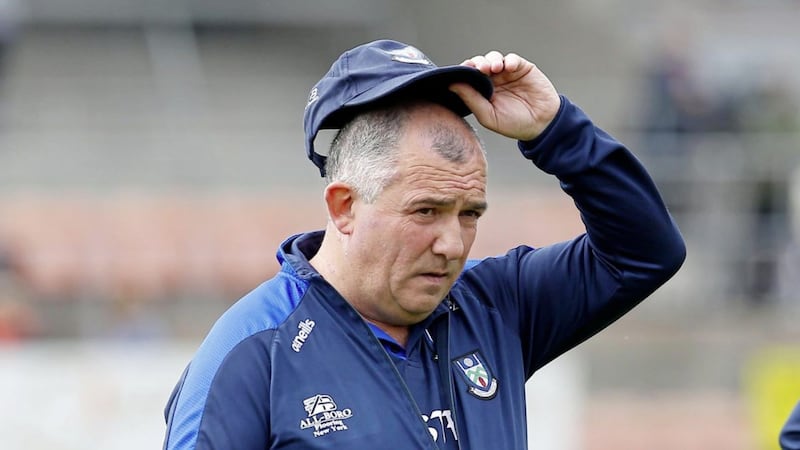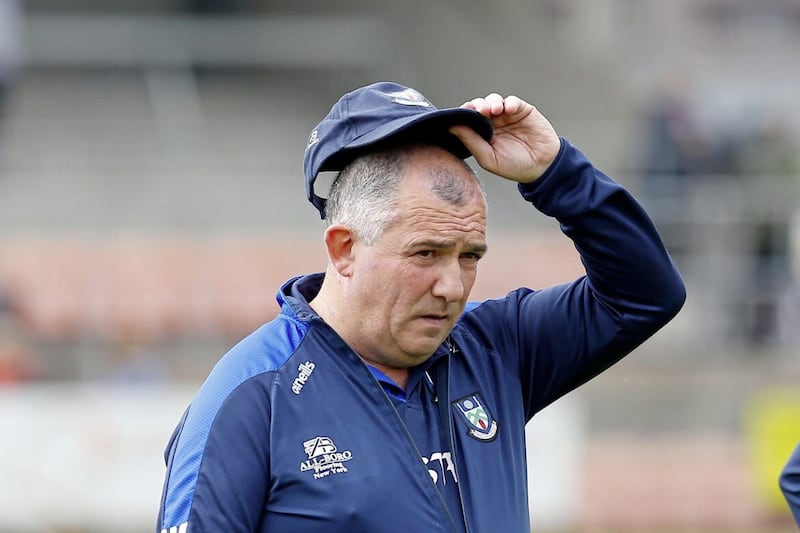IF anyone were to feel a certain degree of loyalty and protection towards GAA referees it would probably be Monaghan manager Seamus McEnaney.
After all, his brother Pat was a long-serving official and eventually headed up the referees’ committee.
Pat McEnaney was a fantastic referee and, while I never always agreed with some of his decisions, he talked to the players on equal, respectful terms.
He knew his players and, addressing you firmly, he would often explain the reasons for a decision.
You knew that Pat had played the game and also that was aware of the key skill required in any official’s armoury – common-sense.
It may not be in the rule-book and, at times, could be considered not that common when discussing any particular official’s performance.
You could literally be tearing your hair out regularly when games were being swayed by such marginal calls.
At inter-county level, the stakes are so much higher than the average club league game.
‘Banty’ arguably had fair reason to be frustrated with Barry Cassidy’s performance, based on what I saw of last weekend’s game between Monaghan and Mayo.
I felt that there was a clear enough penalty claim waved away (when Conor McManus was fouled in the penalty area) in added time with just three points between the sides at the time.
Would it have been scored? Well, we will never know.
Mayo appeared to be getting the marginal decisions in their favour throughout the contest.
It appeared that Monaghan certainly had to work harder for their fouls.
There isn’t a player, manager or coach in the country that hasn’t felt similarly during their career.
In the GAA, the referee’s report
is bible. There is no room for human error when it comes to that particular submitted report.
If it is written down then you can practically take it as an infallible doctrine.
In professional soccer, the authorities have moved much further than in the past and have now started to provide more balance when dealing with officials’ performances.
Referees can now be ‘rested’ and taken out of the cauldron until such time as they can be reintegrated back into the role.
I am not so sure that the GAA approach this is a similarly open and protective manner.
There is no subtle reproach for poor performances nor is there any feasible mechanism whereby managers or county boards can have their frustrations heard.
By ignoring the issue, the GAA appear to hope that time is a healer and that the raw post-match anger will eventually dissipate.
Seamus McEnaney will likely move on, but the sense of injustice from the weekend’s game will linger.
As a player, I still feel a thread of anger towards some officials for what I felt were downright pathetic decisions in certain games.
We have to understand that the lengths all players, club and county, go to, allowing players to get minds and bodies prepared to control their own performance. That the outcome can be dictated by something outside their own control is open to being a major source of resentment.
This newspaper ran a brilliant feature interview with Ballinderry Shamrocks’ former All-Ireland-winning coach Brian McIver recently.
As I recall from his musings on his tenure with Derry seniors, Brian quit the role in frustration over his view on what he perceived as unfair officiating in a huge Championship match.
Brian still had a lot to offer and I would certainly suggest that quitting the game is an extreme reaction to the predicament.
However, the mechanism for an appropriate and proportionate analytical process of officials’ performances is long overdue within the GAA.
By simply ignoring the issue and trusting that it will go away simply isn’t good enough.
***************
It was almost predictable that Armagh would dump Tyrone out of the Championship only to be pitted against Donegal – again – in the Qualifiers draw.
When you eventually get far enough in the Championship, you will have to play the best teams – but there is a ‘but’.
Had I been in the Armagh camp, I would have been disappointed – due to the fact that there is a feeling of ‘freedom’ associated with games outside of Ulster.
Perhaps that is a personal feeling, and I am sure the Armagh players will be looking forward to having another crack at Donegal.
The Orchardmen’s impressive win against a poorly-performing Tyrone side was in part due to their willingness to take risks.
Playing a hybrid game of mixing up a short and long passing style, it appeared that fortune favoured those willing to take a chance.
Aidan Nugent’s goal gave Armagh confidence and I especially enjoyed how he faked to go back outside, cutting inside instead
and drilling the ball low to the net.
I try to coach my own players in unpredictability.
In the modern game, playing style leans heavily toward mitigating risk.
Ball retention and possession is the common theme and should you be unable to carry this out, I would suggest that you will find yourself as a benched spectator.
On that theme, Armagh’s subs played their part too.
Andrew Murnin was particularly dangerous, his second point resultant from a brilliant catch from a long diagonal ball.
Clones is another pitch altogether and Donegal, fresh from their experience against Derry in the Ulster final, they will be well used to the symmetry of this particular cauldron.
Croke Park would have been nice for both teams and indeed for the neutral. After all, with a shortened season and many more teams not eligible for the main Championship, a huge crowd could have been expected.
Certainly, the Orchardmen answered some critics with last weekend’s performance.
However, the only thing predictable about Armagh is their unpredictability.
McGeeney and his men will not have long to rest on their laurels and another set of questions will be asked.
Tyrone had one of those seasons in which they never really got going.
And they can be excused regardless of what anyone can throw at them, given how they won both the Anglo-Celt and Sam Maguire last season.
Historically, teams have always found it difficult to back up All-Ireland titles. Except of course Dublin – they were the total exception to the rule in modern times. No-one since Cork in 1990 had done back-to-back titles since Jim Gavin’s side in 2016.
The Red Hands have a minor and U20 conveyor belt of talent coming through and they will not sit far away from their perch, in Ulster terms anyway.
With Derry, Armagh, Donegal and Cavan still in the Championship, we remain the most competitive province – and believe it or not, still the envy of so many.







